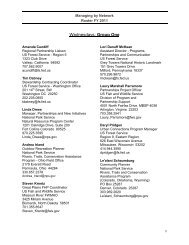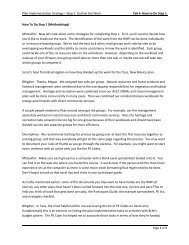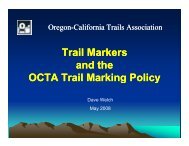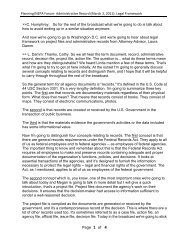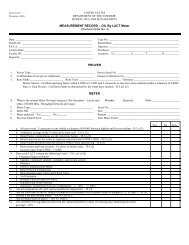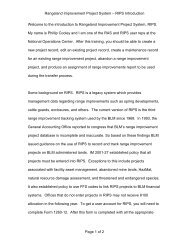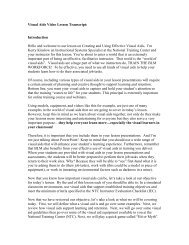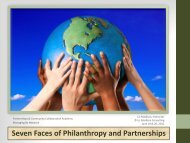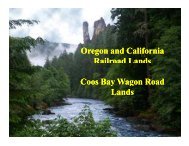BLM Desk Guide to Cooperating Agency Relationships - National ...
BLM Desk Guide to Cooperating Agency Relationships - National ...
BLM Desk Guide to Cooperating Agency Relationships - National ...
- No tags were found...
You also want an ePaper? Increase the reach of your titles
YUMPU automatically turns print PDFs into web optimized ePapers that Google loves.
Section 4<strong>Cooperating</strong> <strong>Agency</strong> <strong>Relationships</strong>:Frequently Asked QuestionsQualifying OrganizationsCriteria for CA eligibility► What types of organizations mayserve as CAs?The CA relationship is limited <strong>to</strong> governmententities: State agencies, local governments,tribal governments, and other Federalagencies.► Within the interdisciplinary (ID)team, is a CA limited <strong>to</strong> participatingonly on the <strong>to</strong>pics on which the <strong>BLM</strong>has acknowledged its jurisdiction bylaw or special expertise, as reflectedin the MOU?A CA is entitled <strong>to</strong> collaborate as part of anRMP or EIS ID team in those areas for whichthe MOU acknowledges the CA’s jurisdictionby law or special expertise. A CA’s formalinvolvement on other issues occurs at thediscretion of the <strong>BLM</strong>’s AO. In practical terms,the scope and nature of a CA’s participationis a matter for negotiation that takes in<strong>to</strong>account the CA’s policy concerns, the staff andresources it can reasonably contribute <strong>to</strong> theeffort, the schedule, and other constraints.► What discretion does the <strong>BLM</strong> have<strong>to</strong> determine the scope of a CA’sspecial expertise?The criterion of special expertise emphasizesthe relevant capabilities or knowledge that aCA may contribute <strong>to</strong> the planning and NEPAprocess. Managers are required <strong>to</strong> offerCA status <strong>to</strong> potentially eligible governmententities, including tribes, when preparing orrevising an RMP or preparing an EIS. It isthe AO’s responsibility, however, <strong>to</strong> determinewhich entities possess special expertiserelative <strong>to</strong> a proposed plan or project and thenature of their expertise, subject <strong>to</strong> reviewby the State Direc<strong>to</strong>r. The claimed expertiseshould be demonstrated (not merely asserted),and it should be relevant <strong>to</strong> the decisions <strong>to</strong> bemade.40 CFR 1508.26 (CEQ)Special expertise means statu<strong>to</strong>ryresponsibility, agency mission, or relatedprogram experience.► How is expertise demonstrated?In most cases, a government entity’s expertiseis demonstrated through staff capabilities andan appropriate program focus. For example,a local government that routinely conductstransportation planning and road maintenancemay be assumed <strong>to</strong> have special expertise onthese <strong>to</strong>pics whether the work is carried out bypermanent staff and/or contrac<strong>to</strong>rs. There aremany small governments that cannot afford <strong>to</strong>keep full- or part-time staff for every resourcearea and consequently rely on consultantsfor help. A government entity without regularprogrammatic responsibilities for a givenresource area, however, cannot establishspecial expertise for the CA relationship byhiring a consultant or specialist in that area.Note: Some expertise is based on informalrather than technical knowledge. (See thediscussion of knowledge of local “cus<strong>to</strong>m andculture” by tribal and local government offi cialsbelow.)Section 4. <strong>Cooperating</strong> <strong>Agency</strong> <strong>Relationships</strong>: Frequently Asked Questions21




